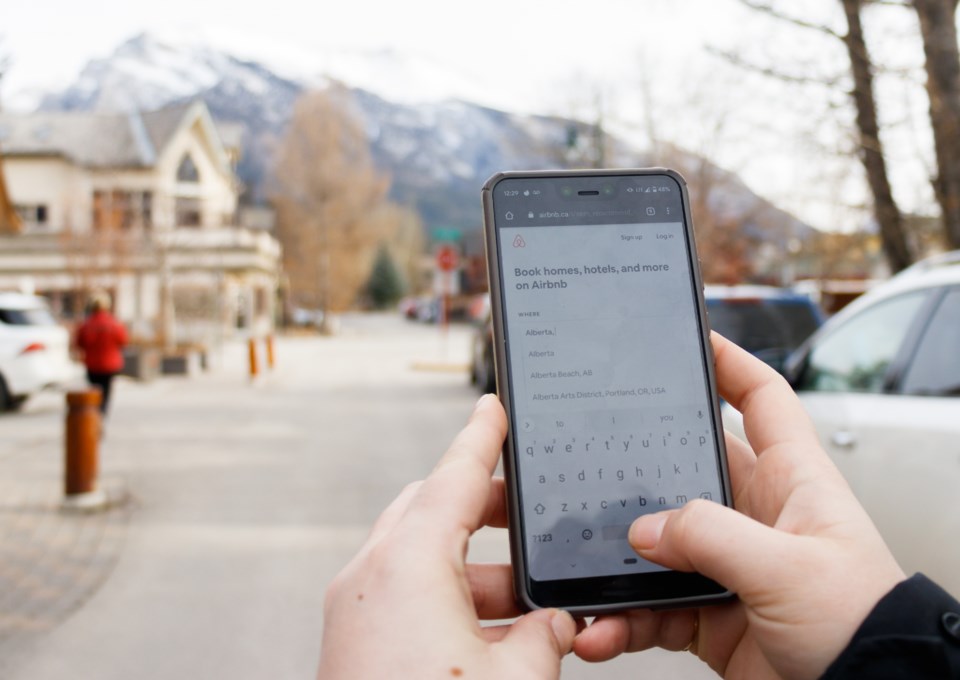BOW VALLEY – A proposed tourism levy for short-term rentals in the 2019 Alberta Budget has local owners questioning how it will benefit them and the community.
The provincial government announced it intends to introduce a tourism levy for short-terms rentals offered through online marketplaces in 2020. This is predicted to result in an approximately $5 million increase per year in the levy beginning in 2020-21 as it is applied.
Banff-Kananaskis MLA Miranda Rosin said the introduction of the tourism levy will aid in “levelling the playing field” between short-term rentals and hotels.
“Airbnbs are essentially operating as businesses and as miniature hotels,” she said. “But, they [short-term rentals] are a completely unregulated market.”
The province applies a tourism levy of four per cent on most types of temporary accommodation rentals, however, the levy was not created to take short-term rentals into account. Because of this, hosts are not required to charge the levy when renting out properties.
“This gives these operators an unfair advantage over hotels and other accommodation providers that are subject to the levy,” states the Fiscal Plan A Plan for Jobs and the Economy 2019-23 section of the 2019 provincial budget.
However, Rosin said the change does not mark the start of increased regulations on short-term rentals, adding that many of these properties are already facing scrutiny within their respective municipalities.
“Canmore and Banff have significantly more stringent regulations than other municipalities in the province,” Rosin said. “I don’t believe that this is going to lead to any extreme over-regulation from the provincial government. It’s a means to level the playing field and have some sort of accountability.”
When asked if short-term rentals will see similar benefits from the tourism levy that hotels experience, such as promotion from Travel Alberta, Rosin said they will benefit from the government’s commitment to double tourism in the province by 2030.
“This [levy] will help us to grow the tourism industry as a whole,” Rosin said. “We want to work with all of our partners within the tourism community to try and grow tourism together.”
Jane Hooper, owner of, FairShare Vacation Property Management in Canmore, questioned how a tourism levy would benefit communities and create an equal playing field.
“The hotels benefit from things the short-term rentals can’t benefit from,” Hooper said, citing the support hotels receive through Travel Alberta and tour groups as an example. “It’s a broader issue than just a ‘fair playing field.’ ”
While she has no problem with the implementation of a levy, Hooper said the money generated from the levy needs to be equal what it returns to short-term rental owners.
“Your mom and pop that own a retirement condo in Canmore that rents it out a few months of the year are not benefiting from the same scale that hotels can benefit from in terms of the marketing from Travel Alberta,” she said. “These are two different business models ... it’s two different markets. It shouldn’t be treated as the same thing.”
In Canmore, residents are unable to rent properties as tourist homes unless the property is designated by the Town as a tourist home or a licenced bed and breakfast, both of which are assessed and taxed commercially.
Canmore Hotel and Lodging Association President John Brownlee has been working in the Bow Valley hotel industry for 15 years, and in that time, he said there has been a noticeable shift in the market as short-term rentals have gained popularity.
“Airbnb has really brought the short-term rental to the forefront,” Brownlee said. “It has taken a lot of countries, provinces and municipalities by storm and by surprise.”
He said he fully supports the province's introduction of a tourism levy because short-term rentals have been operating with “an unfair advantage.”
“Airbnb in this country is a $30 billion corporation and it doesn’t pay any taxes at all,” Brownlee said. “You and I pay taxes, and also hotels are very regulated and also pay their fair share in taxes and provincial levies – these short-term rental businesses do not. They’re getting a free ride.”
The Airbnb website states that “in general, the money you earn as a host on Airbnb is considered a taxable income, which may be subject to different taxes like rental tax or income tax.”
Brownlee said he considers the introduction of a tourism levy on short-term rentals a good place to start in terms of regulation of these properties.
“You’re giving accommodations just like we are, so you should be regulated by the same things,” Brownlee said. “This legislation is fine, but I think we can go much further as well – it’s still not a level playing field.”
Lori Hogarth and her husband own a short-term rental located in the basement of their home in Dead Man’s Flats.
The MD of Bighorn was “smart,” she said because if a property owner plans on hosting a short-term rental they are required to live in the house and are taxed as a residential home.
“I take issue both with the province trying to tax Airbnbs because the feds [federal government] already do it on your income tax,” Hogarth said. “A lot of people who are putting Airbnbs in are doing it to help pay for their mortgage. Everybody’s not wanting to make a gagillion dollars.”
It is frustrating, she said, that she may be charged the same “pillow tax” as hotels. While it makes sense to apply the levy on multiple property owners, she said, it is a “hard pill to swallow for Joe homeowners” who provide accommodations to help cover the cost of their mortgage.
Hogarth added that short-term rental hosts do not have access to some of the benefits hotels have access to including tour groups, staff, lobbying power, advertising, conventions and other opportunities.
“We’re not a hotel,” she said. “I don’t think Airbnb is cutting into their [hotels] bottom line at all."




